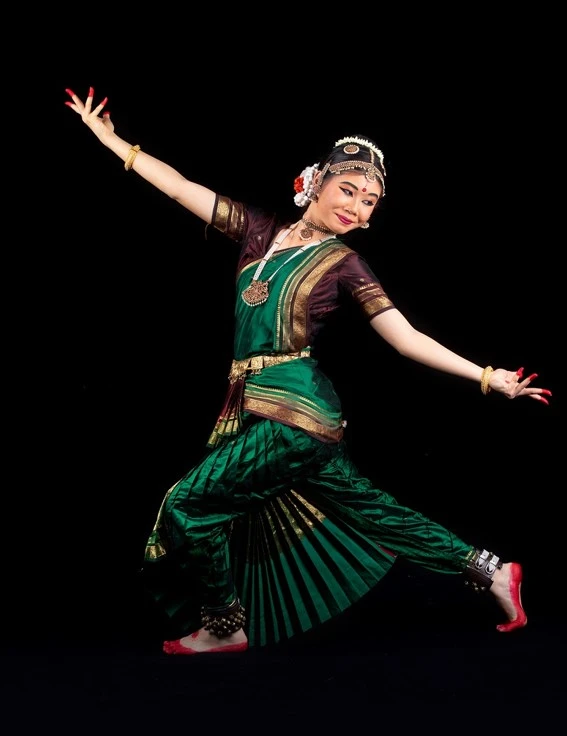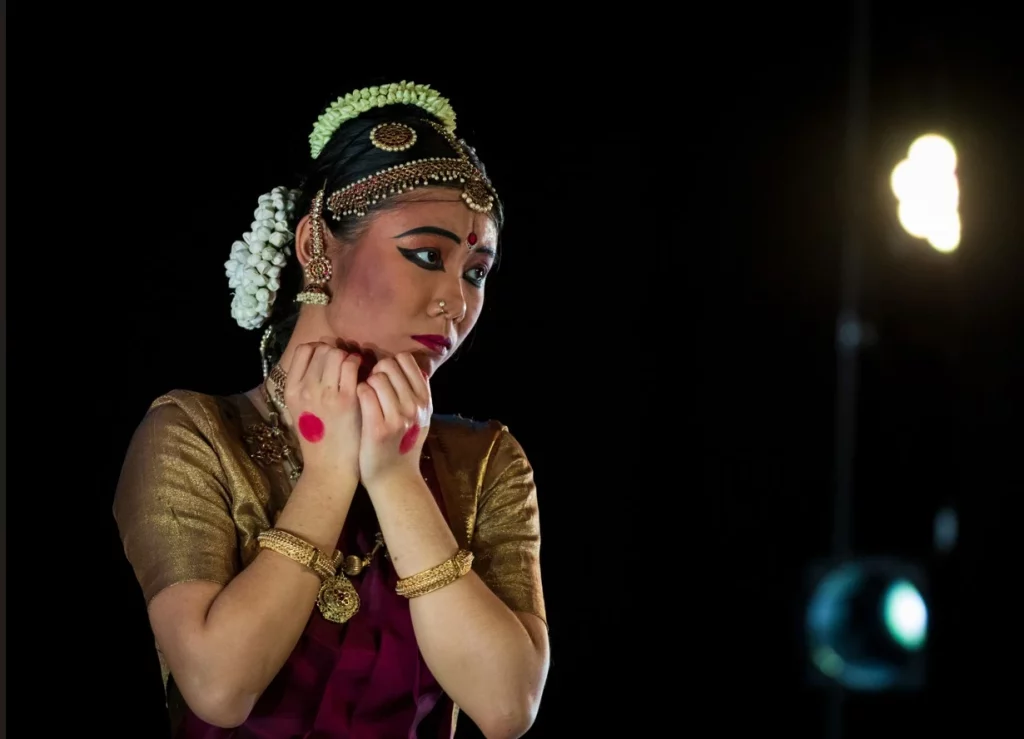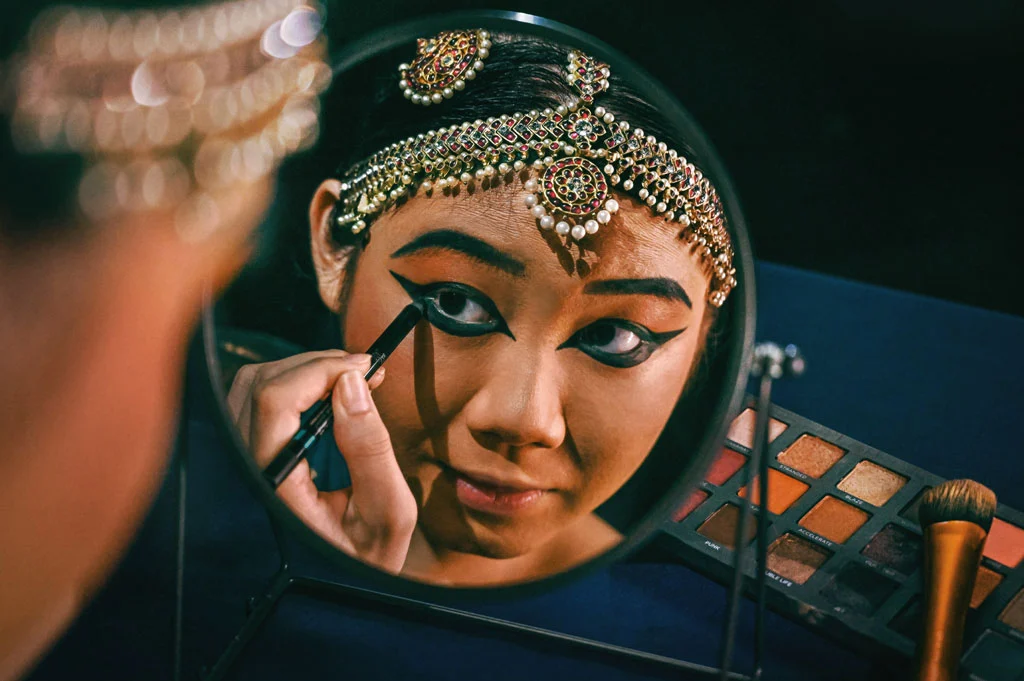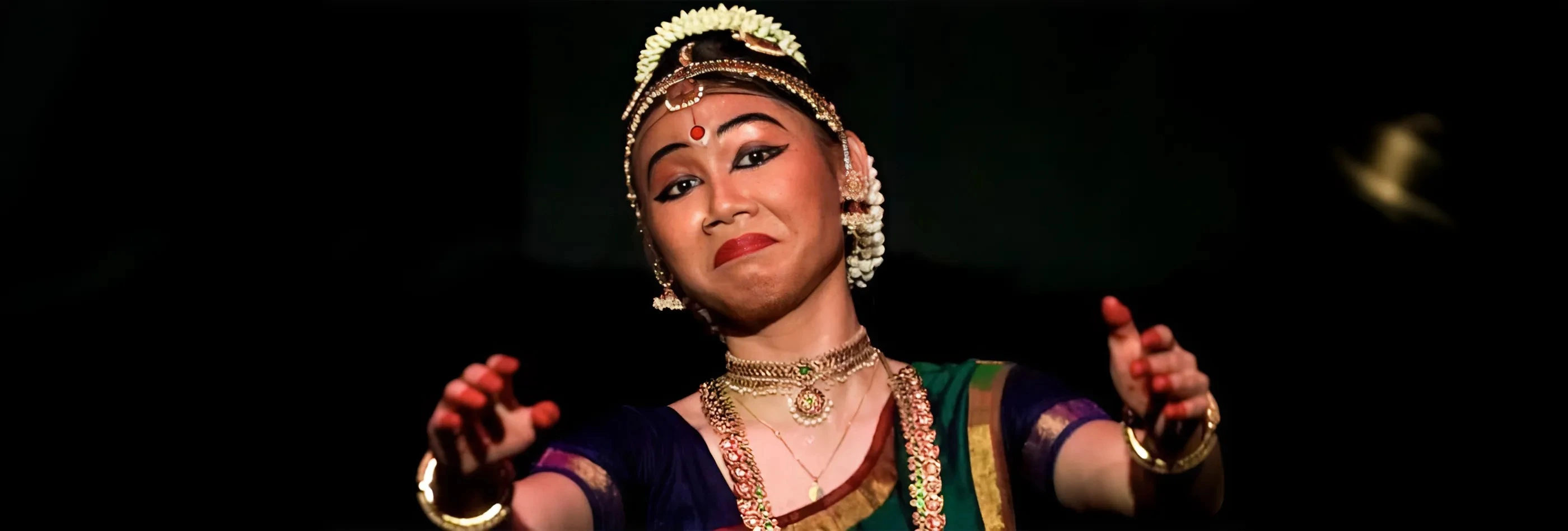(November 13, 2024) When Soo Mei Fei appears on stage, dressed in her Bharatanatyam costume made out of Kanchipuram silk sarees, audiences can’t help but be drawn to her. Her distinct Chinese features, paired with the traditional Indian attire – complete with intricate pleats, jewellery, and expressive makeup – create a mesmerising contrast that has quickly turned her into a rising star. This unique combination, along with her graceful precision and dedication to each movement, showcases a commitment that transcends cultural boundaries, making her performances fascinating.
“I’m blessed to learn Bharatanatyam,” Mei Fei shared in an interview. “It’s such a beautiful art. It’s not been an easy journey, but it has been extremely fulfilling. I want to train more,” she added.

The beginning as a teenager’s curiosity
For Soo Mei Fei, who is now in her twenties, her fascination with Bharatanatyam started unexpectedly at the age of 17. While attending the National Junior College in Singapore, she stumbled upon a try-out session for Indian dance. Originally intrigued by Bollywood, she and her classmates assumed the session would focus on Bollywood dance. To their surprise, they were introduced to Bharatanatyam, a classical Indian dance known for its intricate footwork, expressive gestures, and emotive storytelling. Though the majority lost interest, Mei Fei was hooked.
Determined to understand the art form fully, she began digging into Bharatanatyam’s history, spending hours at libraries near her home in Punggol. “It was fascinating,” she reflected. “I wanted to know everything, from the significance of the hand gestures to the stories conveyed through each dance sequence.” Her dedication to understanding this art form laid the groundwork for the journey that followed.
Challenges on the path
The young dancer’s path in Bharatanatyam wasn’t without hurdles. Learning from Vijaya Nadesan, her instructor at Apsara Arts – a prestigious dance academy in Singapore -Mei Fei soon realised the challenges of grasping the technicalities of Bharatanatyam as a non-Indian. Her Chinese heritage meant that the language, lyrics, and cultural nuances were initially foreign. Mei Fei remembers the struggle of understanding Carnatic music that accompanies Bharatanatyam performances, often resorting to Google Translate and spending extra hours reviewing each lesson.
Despite the obstacles, she dedicated herself wholeheartedly, spending entire days at the academy, watching her teachers and classmates. This immersive approach allowed her to improve steadily, and with time, she began to master Bharatanatyam’s unique hand gestures (hastas), foot movements (sthankas), and facial expressions (abhinaya).


Connecting with Indian culture through dance
Over the years, Bharatanatyam became more than just a dance form for Soo Mei Fei. It became a bridge to Indian culture. She began donning traditional Indian saris, learning the art of wearing them, and embraced the aesthetic requirements of Bharatanatyam. “Most of my friends had their mums to help them get dressed, but I had to learn a lot on my own, getting valuable tips from friends and teachers along the way,” told the young dancer whose Bharatanatyam batchmates are mostly Indian.
Bharatanatyam also introduced her to Carnatic music, which she now adores. “It’s very rich. The lyrics and melody have a lot of meaning behind them. I understand the songs because I feel it,” she explained. The connection was so profound that in 2018, she took up another Indian dance form, Odissi, expanding her knowledge and appreciation of Indian classical arts.
Bharatanatyam in Singapore
The introduction of Bharatanatyam to Singapore began with pioneer practitioners from India and Sri Lanka, who brought the classical dance form to life through their productions that included members of the diaspora and non-Indian artists. This collaboration promotes unity in diversity, as people from different ethnic communities bond over learning and performing Bharatanatyam. These interactions also lead to an exchange of ideas across ethnic dance styles. Inspired by their teachers, students of these pioneers have begun using Bharatanatyam as a tool to educate Singaporeans on social issues, breaking traditional boundaries. While performances were once rooted in Hindu texts and mythology, today, the youth choreographers have shifted towards using Bharatanatyam to convey meaningful messages, moving beyond entertainment.


Arangetram: A milestone in her journey
Soo Mei Fei’s commitment culminated in her Arangetram in 2021, a debut solo performance that marks a dancer’s readiness to perform on stage independently. This achievement was a significant milestone, as Arangetram is often regarded as the pinnacle of a Bharatanatyam dancer’s journey. Amidst the COVID-19 pandemic, Mei Fei worked tirelessly, balancing her part-time job, university studies, and dance practice to prepare for the performance.
Reflecting on the challenges she faced, Mei Fei shared, “I didn’t have time to practise for the entire week before the rehearsal, and I just hoped my efforts from before would pull me through. My rehearsal ended up going okay, and that’s when I realised that sometimes you just have to let go.” This experience taught her to trust her skills and the journey she had undertaken. “The movements in Bharatanatyam are very structured, and the dance itself just gives me a form of stability. It is my solid anchor,” she shared, expressing how dance has become her grounding force amidst life’s challenges.
Empowering through art and education
As a certified Bharatanatyam dancer and a graduate in Fine Arts from LASALLE College of the Arts, Soo Mei Fei’s journey now extends beyond personal achievement. She’s passionate about fostering an appreciation for Bharatanatyam among younger generations, especially non-Indians. “Art should not have boundaries. It’s a great learning experience to know more about another culture that is different from us,” she says. “In doing so, we discover that we are more similar to each other than we thought”.
Her work as an instructor at children’s enrichment centres and dance academies in Singapore allows her to instil this philosophy in her students. To Mei Fei, Bharatanatyam is more than a series of movements—it’s a means of personal growth, self-expression, and cultural discovery. She sees her students not just learning dance techniques but also developing qualities like discipline, resilience, and empathy.
Looking Ahead…
Soo Mei Fei envisions a future where Bharatanatyam continues to flourish across cultural boundaries. She’s interested in exploring collaborative projects that merge Bharatanatyam with other art forms, such as classical piano or visual arts, and creating interdisciplinary performances that bring new dimensions to the traditional art form.
For Mei Fei, every step she takes in Bharatanatyam makes her belief stronger that art transcends borders and unites people from diverse backgrounds. Her journey reflects the power of curiosity, dedication, and the unyielding pursuit of passion. Soo Mei Fei reminds us that the language of art is universal, resonating with the heart regardless of where we come from.




